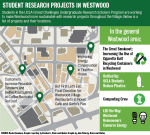Students will build a succulent-filled wall at the Broxton public parking structure this week to add colorful, sustainable scenery to Westwood.
Several undergraduate student groups are working on similar projects that aim to improve ecosystem health in Los Angeles as part of the UCLA Grand Challenges-Undergraduate Research Scholars Program. The UCLA Grand Challenges Sustainable LA initiative, which also aims to reach 100 percent renewable energy and 100 percent local water by 2050, was launched in 2013.
Some of last year’s undergraduate students aimed to make the campus more sustainable by surveying energy usage of the treadmills in Wooden Center and advocating for eco-friendly ones, said Rachel Kennison, assistant director of Undergraduate Research Center – Sciences, who administers the Grand Challenges Undergraduate Research Scholars Program. This year, the program spread into Westwood to encourage students to impact and promote sustainability on a larger scale, she added.
The succulent wall project aims to improve ecosystem health by preserving biodiversity while beautifying the environment, said Michael Rupic, a third-year geography and environmental studies student who works on the project. He added the wall also saves water because succulents need much less water than normal plants.
“With this wall, we want to bring nature into our daily life, adding new elements to the typical urban surroundings,” Rupic said.
Students from another project redesigned cigarette butt recycling receptacles in Westwood Village to look like basketball hoops, said Kinan Bachour, a fourth-year molecular, cell and developmental biology student, who advised the research group. He added he hopes the new design will catch people’s attention and encourage them to recycle cigarette butts.
“Not a lot of people know cigarette butts are recyclable,” Bachour said. “But Westwood has already set up receptacles for these butts, and companies will recycle them into eco-friendly furnitures.”
Bachour’s group conducted surveys in Westwood Village to study how people usually dispose cigarette butts and how much knowledge they have about recycling them, Bachour said.
The Grand Challenges program also teaches students practical skills like negotiation, communication and marketing, said Sarah Chiang, a fourth-year environmental science student who advised a food donation program.
Chiang’s group aims to encourage local restaurants to donate leftovers to food organizations that help people in need, she said.
She added the group had a hard time reaching out to restaurants and persuading them to work with them.
“Many restaurants are cautious about our intentions and are not so willing to cooperate,” Chiang said. “They (tell us) they do not have leftovers, but they do.”
The group keeps long-term records of the amount of leftovers at certain restaurants so group members can schedule food donations on a daily basis, Chiang said.
“We need to reach our goal without interrupting restaurants’ daily operations,” Chiang said. “That takes a lot of communication skills.”
Some students in the program said working on these research projects helps them gain practical skills for their future careers.
“Sustainability is an amazing idea, but an idea is not enough,” Bachour said. “The Grand Challenges program … also teaches us the skills needed to spread the idea in the real world.”
Students in the program will showcase their projects during the Undergraduate Research Week at the Sustainable Green Gala on May 23, and on Research Poster day in Pauley Pavilion on May 24.
The Grand Challenges program is accepting applications from second- and third-year students for the 2016-2017 school year. Applications are due April 17.
